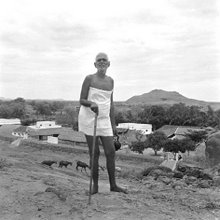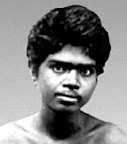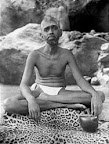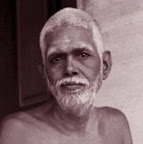1. No photograph of Bhagavan as a child is available. Young Venkataraman was once photographed with his uncle. For that photograph he was asked to place his hand on a big book as if he was very studious. Suddenly a fly landed on his face to drive away which he lifted his hand. It was at that very moment that the photographer clicked the camera. Naturally, the photo was no good; even that could not be traced anywhere. The first photograph of Bhagavan now available was taken in or about 1900 at Virupaksha cave by a devotee from Kumbakonam, Nalla Pillai.
2. Here is another anecdote narrated by Bhagavan: An old, lame man of Arunachala wished to leave his family in disgust and began walking with the help of a stick. He took the giri pradakshina road to leave the town. He had earlier performed the pradakshina several times but as he was about to leave the town, he felt very sorry. Suddenly a Brahmin youth appeared from nowhere and took away the stick from the old man saying: "Do you need this still?" and disappeared. From that moment the old man became normal. At the time of this story Bhagavan was on the hill but he never said that it was he who set right the old man's foot. A similar story can be found in Arunachala Purana.
3. A European devotee set out to explore the Arunachala hill all by himself without any guide. As he did not return even by late evening, people at the Ashram became anxious. Bhagavan was at that time sitting near Ramana Teertham and looking at Arunachala with a pair of binoculars. A little after dusk the devotee returned, exhausted and narrated that while on the hill he had lost his way and that Bhagavan had guided him back to the Ashram. Everyone was astonished to hear this and wondered how Bhagavan who was in the Ashram all the time could have guided the devotee.
4. Rudraraj Pandey, Principal of a College at Khatmandu, visited the Arunachaleswara temple to have the darshan of the Lord. He took the help of a guide at the temple. As they neared the sanctum sanctorum the guide began chanting aloud "Arunachala." Pandey wanted to have the darshan of the linga but all that he could see was the pleasant, smiling countenance of Bhagavan all over the place. Overwhelmed, Pandey shed tears of joy.
5. A devotee once sought Bhagavan's permission to take to sannyasa [?] as he was no longer able to face the problems of family life. Bhagavan advised him against it but the devotee persisted saying, "You came away but you say that we should not." Bhagavan replied "When I came, I did not seek anyone's permission". At this, the assembled people broke into laughter.
6.
Bhagavan had a fine sense of humour and his comments were polished, never hurting anybody. When the pain in his joints became pronounced, not only his
attendants but even some devotees took part in massaging his legs. A seventy year old retired judge also wished to do the same. When Bhagavan asked him the reason he said "Let me earn some punya," Bhagavan then said, "All of you please be quiet for some time. I also wish to earn some punya massaging these legs," and actually began doing so.
7. An asthma patient requested Bhagavan to grant him relief from the ailment. Bhagavan said, "I also have the same problem; at least you have a Swami to whom you can appeal, what about me? I see no Swami. One has to accept whatever befalls him."
8. A youth once asked Bhagavan to tell him the "way to moksha [?]". Bhagavan replied, "Go back along the same way as you have come." The youth did not grasp the meaning and sat disappointed. Others present clarified the matter for him thus, "What Bhagavan says is correct. First of all arose the I-thought and thereafter other thoughts, that is the mind, arose. To enquire into the source of all thoughts is what is meant by `going the same way as you have come'."
9. Behind the darshan hall there was a mango tree. Instead of climbing the tree to pluck its fruits some people were using long sticks to beat it and in the process a number of leaves and twigs also fell down. At that moment Bhagavan happened to pass that way and he admonished them, "Enough, enough. In return for the fruit it gives we are destroying the tree. Quite a nice thing to do. Please go away."
Similarly, Echammal once wished to perform a vrata
of a "hundred thousand leaves." But she could not collect the required number of leaves and she told Bhagavan about it. Bhagavan suggested that she pinch her body instead and fill up the gap. Echammal could not follow and asked "What is that?"
Bhagavan: If you pinch your body you feel the pain but you think that by plucking the leaves the plant does not feel any pain.
10. A well dressed man walked into the hall even without leaving his footwear outside and asked Bhagavan, "Have you seen God?" Bhagavan put on an innocent face and asked "God? Who is he?" The young man was dumbfounded, while everyone else laughed. A little later he asked Bhagavan if he could take a photograph of Bhagavan. "Yes, if it is possible," said Bhagavan. (The youth could not understand the import of this.) What Bhagavan meant was that he was the atma and that it was impossible to photograph it. Yet the youth clicked his camera and went his way.
11. Bhagavan once heard from somebody that a yogi observed in his subtle body how far the aura of Mahatmas spread. In that process he claimed to have seen the aura of the Buddha spread over a mile, Sri Aurobindo's seven furlongs whereas Bhagavan's went over three miles but still continued going. As a result, he could not see the end. After hearing the story Bhagavan said, "If only he enquired into what his subtle body was, all these problems would have been solved."
12. During his stay at Virupaksha cave Bhagavan used to take a myrobalan (Karakkai, in Telugu) every day as a preventive for constipation. At one point of time all the myrobalans in the ashram were over and Palaniswami was planning to go to the town to fetch them. Just then a villager came to the ashram with a bag-full of those fruits and offered them to Bhagavan. It so happened that as the villager set out to have Bhagavan's darshan by his cart, some myrobalans began leaking from a bag placed in another cart which was moving just ahead of him. The villager picked them up thinking they would be useful for Bhagavan. He reached the ashram just as Palaniswami was setting out. Similarly, on another occasion, Palani was about to get some grapes for Bhagavan when Bhagavan said to him, "What is the hurry?" Just then the brother of Seshayya came with a packet of grapes and offered them to Bhagavan. He did so as a matter of courtesy not because he knew that the ashram did not have grapes just then. Bhagavan's attendant Ayyaswami used to say that whatever be the requirements of Bhagavan they used to be met in time without any effort.
13. Sundaresa Iyer who belonged to Tiruvannamalai came to Bhagavan quite early in his life. Much later he had to take up a job at a different place but was reluctant to leave Bhagavan. He went to Bhagavan and wept. Bhagavan asked him, "How long have you been with me?" Sundaresa Iyer replied, "Forty years".
"Look," said Bhagavan addressing everybody in the hall. "He has been with me for forty years listening to me.
Yet he says he cannot go to a place where I am not." Bhagavan possibly meant that there was no such place.
14. Bhagavan resolved the difficulties of his devotees and of those who sought refuge in him. Sundaresa Iyer had to write the foreword for a collection of Bhagavan's Tamil works about to be published. He concluded the foreword saying, "It is believed that those who read these works will be blessed." Bhagavan corrected this, removing the expression `believed' and said, "Those who read these works will be blessed."
15. To Sivaprakasam Pillai, Bhagavan said, "One who has the grace of the Guru will surely attain liberation, the Guru will never forsake him. A sishya coming to a guru is like something that falls in the jaws of a tiger."
To a Dutch devotee, Hartez, Bhagavan said, "Even if you leave Bhagavan, he won't leave you." Someone immediately asked Bhagavan, "Is this special to him or does it apply to all."
"It applies to all," came the reply. Bhagavan said to Kitty, Osborne's daughter, "If Kitty thinks of Bhagavan, Bhagavan also thinks of Kitty."
16. A disciple once lamented, "If you do not take pity on me what can I do? There is no sinner like me."
Bhagavan: What is the connection between me and you?
Disciple:
You are my Gurudeva.
Bhagavan: You say I am your Gurudeva but have you given me any guru-dakshina?
Disciple:
I have always been ready to make an offering but Bhagavan had never been ready
to accept it. Please let me know what I should offer.
Bhagavan: Are you sure you will not back out? Disciple:
How can you say so, will I ever break a promise?
Bhagavan: You gift me the fruits of all your meritorious acts (punya).
Disciple:
Why not? But I have no punya to my credit.
Bhagavan: Give me whatever punya you have. Disciple:
I hereby gift all the fruits of my punya to Ramana.
Bhagavan: You said that you could give only a little, why not gift that which you have in abundance?
Disciple:
I shall do so. But let me know what I can give.
Bhagavan: I will, but you must not back out. Disciple:
Never, I shall never back out.
Bhagavan: If so, give me all your sins. Disciple:
Oh Bhagavan! I have committed innumerable sins.
Bhagavan: I am not concerned with that. Will you give or not?
With great anguish the disciple said, "I gift all my sins and their fruits to Ramana as ordered by him. I have nothing to do with them any more."
Bhagavan: Now see, you have neither merit nor de-
merit any more. As you are the Atma you
don't have to grieve any more. Simply be, do nothing.
17. To another devotee Bhagavan said, "Even if you go to hell I shall follow you. But my question is why should you do acts that could lead you to hell?"
18. Another devotee said to Bhagavan, "Bhagavan, so long as we are in your presence we are all good people but once we return to our place we resume our usual activities. I have been coming here for so many years now but I do not seem to have progressed even a little bit."
Bhagavan: Those who travel by first class inform the guard of the train where they have to get down and ask him to wake them up. Thereafter they shut the windows and go to sleep. Do they wake up midway and ask themselves whether they had crossed their destination already? You are all like first class passengers. You have informed the guard about your destination. Does not the guard know what to do? When your destination arrives the guard himself will come and wake you up.
Can there be a greater reassurance than this?
Referred Resources:
Links to letters:
Echamma: (Chapter 15: Echamma’s Demise
pradakshina: (Chapter 41: The True Nature of Pradakshina
Links to rl:
Virupaksha: (Chapter 18: The Peerless Hill
Sundaresa Iyer: (Chapter 34: Followers
Ayyaswami: (Chapter 28: Life on the Hill
Palaniswami: (Chapter 15: Yoga Siddhi
Sivaprakasam Pillai: (Chapter 20: Sivaprakasam Pillai
1900: (Chapter 19: Commencement of Instructions
Echamma: (Chapter 21: Echammal
Echamma: (Chapter 40: Withdrawal of the Manifestation
Links to sp:
Links to gems:
I-thought: (Chapter 4: ‘Who am I?’ — Enquiry
renunciation: (Chapter 10: Renunciation





No comments:
Post a Comment